The Eversolo DMP A6 (buy at Amazon), which retails for $859, is a full-featured audiophile music streamer and audiophile digital to analog converter (DAC) that from here on out we will refer to as a streaming DAC. The Eversolo DMP A6 has garnered well-earned, high praise amongst YouTube Audio influencers, who are mesmerized by this component’s good looks, which exude quality with its combination of a six-inch LED touch display and high-end build quality, plus an extended list of features that we never thought possible at this price point. Let’s look deeper into the Eversolo DMP A6, its features, and its performance, while comparing it to the competition. The review will provide some insight and considerations that will aid in choosing your next affordable streaming DAC.
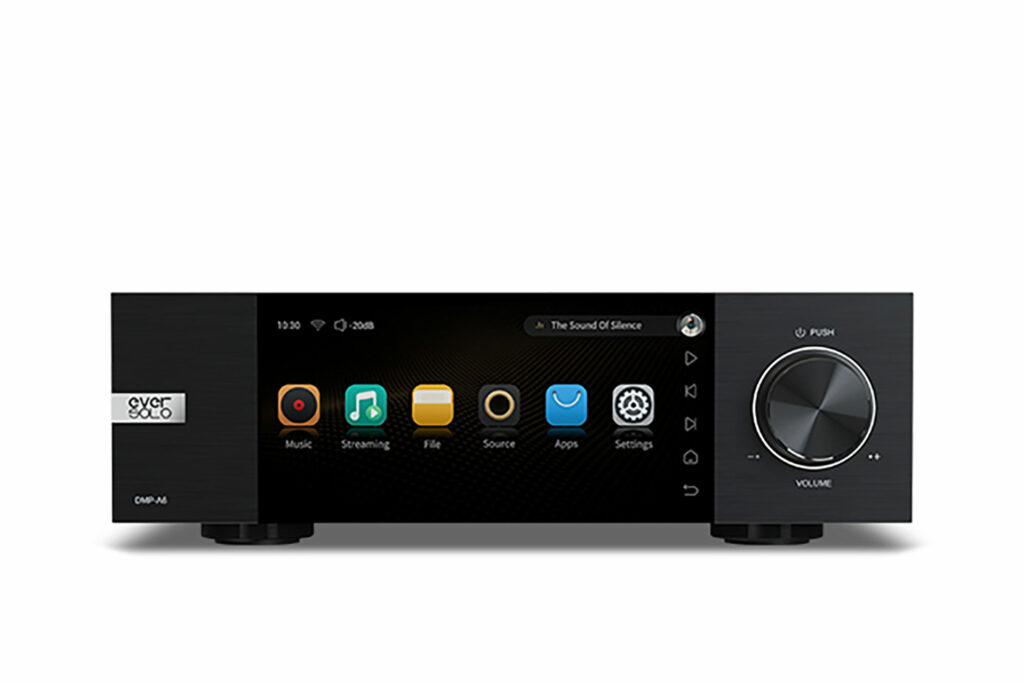
What Makes the Eversolo DMP A6 Streamer So Special?
- The Eversolo DMP A6 has an impressive build quality, using solid aluminum panels with a slick and functional high-definition liquid crystal touch display (LCD) that goes beyond its retail price of $859.
- All the inputs and outputs you would expect, including balanced and single-ended audio outputs and Bluetooth 5.0 AptX HD connectivity.
- The Eversolo DMP A6 can be used as an audiophile preamplifier, switching between its various inputs with analog volume control. That adds real-world value for those just getting started in the hobby.
- The Eversolo DMP A6 processing power and storage starts with a Quad Core ARM Cortex-A55 processor and four gigabytes of DDR for Random Access Memory (RAM) and 32 gigs of eMMC (embedded multi-media card) for permanent memory.
- Somewhat unique in its audiophile value proposition, the Eversolo DMP A6 has four music streaming services integrated into its operating system: Tidal, Qobuz, Highresaudio, and Amazon Music. Tidal Connect and Spotify Connect are supported, while Apple Airplay 2 allows streaming directly from your iPhone or iPad. The DMP A6 also supports Roon, which is pretty much the most popular audiophile music management software that was recently purchased by Harman.
- A proprietary free downloadable mobile app for Android and iOS phones and tablets allows those devices to control and manage music on the A6. This gives the Eversolo user interface chops like a Sonos Port or a Bluesound Node, and that is a very good thing.
- The Proprietary Eversolo Operating System (EOS) can bypass Source-Code restrictions (SRC) globally. This feature allows the A6 to download third-party apps like Apple Music (and others) to avoid the SRC restrictions that limit lossless playback, thereby allowing a 24/192kHz lossless digital music file directly from the DMP A6: a massive win for Apple Music subscribers. However, it sounds nefarious, and I have not seen this functionality on mainstream brands. Nevertheless, I confirmed that it does work, so if you are into such things … go for it.
- The Eversolo DMP A6 DAC section comprises two Sabre ES9038Q2M DACs: one DAC for each channel, providing independent right and left decoding, DSD512 Native, PCM 768kHz@32Bit, with full MQA decoding and support for every file format that I can think of.
- The A6 can house an internal solid-state drive (SSD) of up to four gigabytes for your purchased digital music files. The SSD (drive) itself is not included, but they aren’t very expensive these days on Amazon.
Why Should You Care About the Eversolo DMP A6 Music Streamer?
The Eversolo DMP A6 is rich with form and function and, at $859, offers a killer value proposition. More importantly, more established audio manufacturers have recognized the Eversolo DMP A6 and started to up their game. Some products from these more mainstream companies have come down in price. For example, the Bluesound Node was originally $599, but currently retails for $499 (buy at Crutchfield). Other manufacturers have updated their product models: for example, the Cambridge CXN100 has replaced the CXN V2 with more features in line with the Eversolo DMP A6. Regardless of my observations and any conclusions I may draw, products from legacy audio companies are coming out and stepping up with each new release. So, let the fun begin with a new wave of streaming DACs entering the market. I am excited to see what the future holds in this segment.
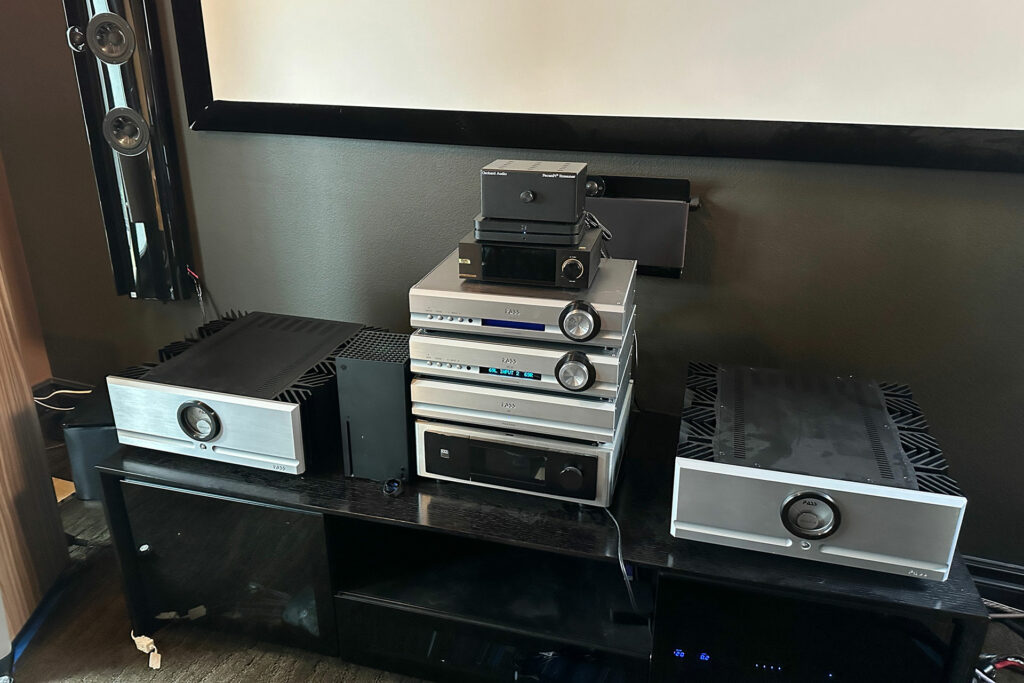
Some Things You Might Not Like About the Eversolo DMP A6 Music Streamer…
- Eversolo is a newer audiophile company with no reliable track record and proven ability to weather the standard business cycles. For example, they aren’t quick to respond to emails thought their website – if at all.
- While using the DMP A6, I noticed some unusual control procedures. For example, the mobile app can only power off the unit because it disconnects the A6 from the Internet, making it impossible to power the unit from the app. I also noticed inconsistent screen saver behavior. In the Eversolo online community, there were a host of issues. Sometimes, problems are resolved, but other times, they are not. I settled some of my questions and realized that some features were less straightforward than I had hoped.
- Eversolo provides a manual covering essential operations, leaving out instructions on how to use many features of the DMP A6. On the Eversolo website, there is a not-so-helpful FAQ, some single-topic guides, several links to YouTube reviewers, and a user community group chat. Customer support directly with Eversolo was nonexistent, as I sent a few messages without a response.
- Eversolo is a newer consumer electronics company, and the DMP A6 was their first streaming DAC on the market in early 2023, so it has a limited track record.
- In the United States, Eversolo is sold mainly, if not entirely on Amazon: if they have a retail dealer network, it must be small and not primarily apparent. We aren’t suggesting that it is easy to build a robust dealer network in the United States for a new, affordable audiophile line, but even having a few options other than Amazon (perhaps Crutchfield, BestBuy.com etc. …?) would add stability to the distribution argument.
Listening To the Eversolo DMP A6 Music Streamer…
With the Eversolo DMP A6 connected to my Pass Labs XP 22 preamplifier (read the review), which runs into to a pair of Pass Labs XA60.8 (read the review) high-current monoblock amplifiers, and then to the highly-regarded Focal Kanta No. 2 floorstanding speakers, this streaming DAC gets a formidable opportunity to strut its stuff. These amplifiers operate full tilt in Class-A mode up to 60 watts per channel at eight ohms, doubling power at four ohms and again at two ohms. The system benefits from Wireworld Eclipse 8 speaker cables, interconnects, and Electra 7 power cables for the amplifiers. While this system may not be your first choice, it is hard to deny that it is a highly resolving system. Tidal was my streaming service of choice for this review.
First, I listened to the Eversolo DMP A6 with the familiar song from Joni Mitchell, “Both Sides Now” from her Clouds album, due to its more straightforward acoustic composition and female vocals. It was a whole-range sound that was well-balanced and had good staging and broad width. The sound was linear without any exaggerated bumps in frequencies. Joni Mitchell’s voice was smooth but detailed, with pleasant and satisfying clarity.
The song “Sultans of Swing” by Dire Straits on their Best of Compilation offered a more complicated ensemble. Like the track by Joni Mitchell, the imagery was excellent, placing vocals center and above the speakers, providing a realistic soundstage and, at the same time, a natural texture to the voice. The image was also wide, but not quite 180 degrees. Electric guitars sounded exceptionally crisp and lively, as you’d expect from an in-studio sonic experience.
I wanted to hear an in-depth demonstration of acoustic guitars, so I turned to Rodrigo y Gabriella on their “Hanuman” track from their 11:11 album. Clarity and crispness are the first qualities that came to mind as I listened, as well as a good dose of midrange. It was projected right in front of the audio cabinet and right and left speakers, providing an enjoyable experience.
I had the highly-regarded Bluesound Node in my possession from my recent review and performed a side-by-side comparison to the Eversolo DMP A6. All cables were the same, from single-ended interconnects to power cables. Connecting the DMP A6 and the Node to the Pass Labs XP-22 preamplifier on separate inputs, allows for quick A-B testing on the fly with queued-up identical tracks. Playing all the tracks noted above and then some, I came away with a surprising conclusion: there was no discernable audible difference between the Eversolo DMP A6 and the Bluesound Node. This discovery left me at a crossroads: the Bluesound Node is an excellent-sounding streaming DAC, but I was expecting the DMP A6 to take me to a higher level. However, if I can’t confidentially discern a practical difference with this level of scrutiny on such a high-resolution audio system, you may want to question if you could.
I was extremely fortunate to have access to the step-up version of the Eversolo DMP A6 during this review: the Eversolo DMP A6 Master Edition, which I discuss further in the competitive products section below. Both DMP A6 units were connected using the balanced outputs. At first, there was a slight difference between the two Eversolo units. When measuring SPL, a 1 to 1.5-decibel difference was confirmed, with the Master Edition running a little higher, which could promote a psycho acoustic enhanced advantage. But, with volume balanced, audibly, there was no discernable difference between the Eversolo DMP A6 and DMP A6 Master Edition – another surprising conclusion.
During this review, my good fortune is to continue with the delivery of the Orchard Audio Pecan Pi+, which retails for $799. I will not get into detail here since a full review of the Orchard Audio Pecan Pi+ is forthcoming. However, I will admit the Pecan Pi+ displayed an improved overall audio presentation, better than the Eversolo DMP A6, DMP A6 Master Edition, and Bluesound Node.
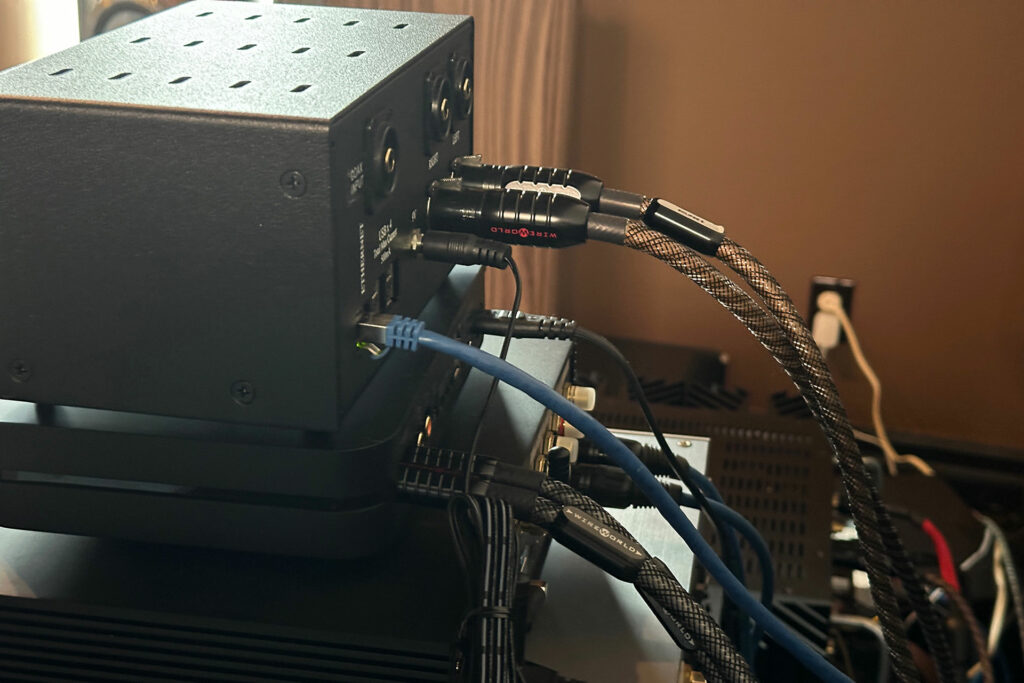
Will the Eversolo DMP A6 Music Streamer Hold Its Value?
Given that Eversolo is a newer company without a reputation and no history concerning quality control and longevity, along with questionable customer support, I do not have high hopes of Eversolo being immune from below-average depreciation. Additionally, all streaming DACs and standalone DACs in this category inherently do not hold value, since new DAC technology is evolving rapidly, at least faster than in other electronic categories.
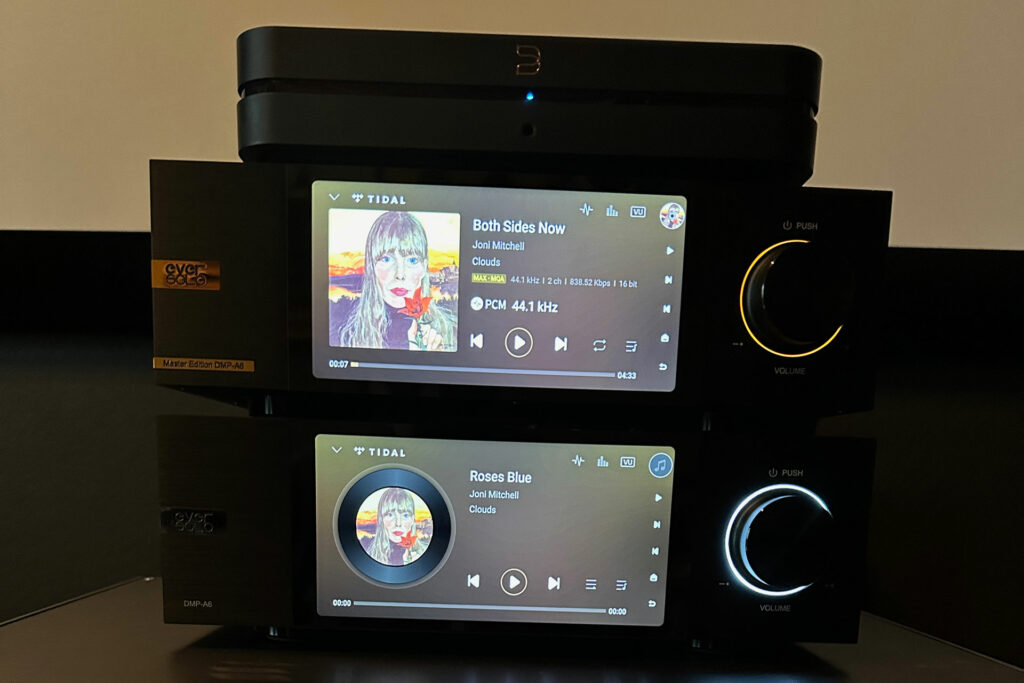
What Is the Competition for The Eversolo DMP A6 Music Streamer?
Eversolo DMP A6 Master Edition (buy on Amazon)
Since I discussed the Eversolo DMP A6 Master Edition that retails for $1,299, $440 more than the standard version, in the listening section, it only makes sense to consider it an alternative. After all, the Master Edition possesses Femtosecond oscillators and OPA1612 operational amps for some improvement. There is a lot of noise online about how the Master Edition is superior, and all I can say is that the placebo effect is running strong in this instance. An inconsequential gold nameplate indicating Master Edition, as well as a gold-lighted ring surrounding the control knob, are visual cues of the upgraded model, but provide no advantage. I mentioned earlier that I could not discern an obvious sonic difference. If the DMP A6 still appeals to you, stick with the base model and save $440.
Bluesound Node $499 (buy at Crutchfield)
I reviewed Blue Sound Node not too long ago. While the Node’s $499 is much less than the cost of the DMPA6, it is not nearly as handsome as the Eversolo. However, as I point out in my review, the Bluesound Node performs well, especially for its asking price. And now we know it sounds as good as the DMP A6 and DMP A6 Master Edition – to me. Budget-conscious audio enthusiasts who focus more on sound quality than appearance and an extended feature list can rejoice, since they have an excellent option at $499, which makes the Bluesound Node a smokin’ deal. As part of the Lenbrook Group, Bluesound has been in business for ten years, with an extensive dealer network, including Best Buy, with access to corporate customer support.
Cambridge Audio CXN100
The Cambridge Audio CXN100, with an MSRP of $1,099, is a newly-released streaming DAC replacing their CXN V2 model. It is a complete redesign, changing the DAC chip to an ESS ES9028Q2M model for its digital to analog conversion, and it operates up to 32-bit rate and 768kHz sampling rate. One of the first noticeable characteristics of this unit is the full-size audio component width, which I appreciate. It has a color screen showing album art, streaming services, and track information and streaming. The central processing unit and operating system use Cambridge Audio’s proprietary StreamMagic Gen4 module, which supports Tidal, Qobuz, and Deezer integrated into their operating system, as well as support for Spotify Connect and Tidal Connect for connection through those services’ native app, and is Roon-ready. Like many components in this segment, the CXN100 has some preamp functionality if desired. Lastly, Cambridge Audio is a 50-year-old company with a significant dealer network and customer support.
Orchard Audio Pecan Pi+ Streamer (buy direct – read review here )
The Orchard Audio Pecan Pi+, with an MSRP of $799.95, is the most unique of this bunch. First, it is designed and assembled in New Jersey. The casework is a simplistic rectangular box untypically proportioned for an audio component, a bit tall, but it is a solid box with a single volume knob dead center on the front. It is not wireless, opting for a wired Ethernet connection to the Internet. It does not have a long list of unique features, but it checks all the boxes of my needs. The DAC in this model uses the top-of-the-line AKM AK4499EXEQ, along with the AK4191EQ companion chip. The Raspberry Pi 3 computer platform is the backbone of this unit. A pending full review of this compelling component is forthcoming but, as stated above, there was a noticeable improvement of the overall audio presentation when compared to the streaming DACs discussed in this review.
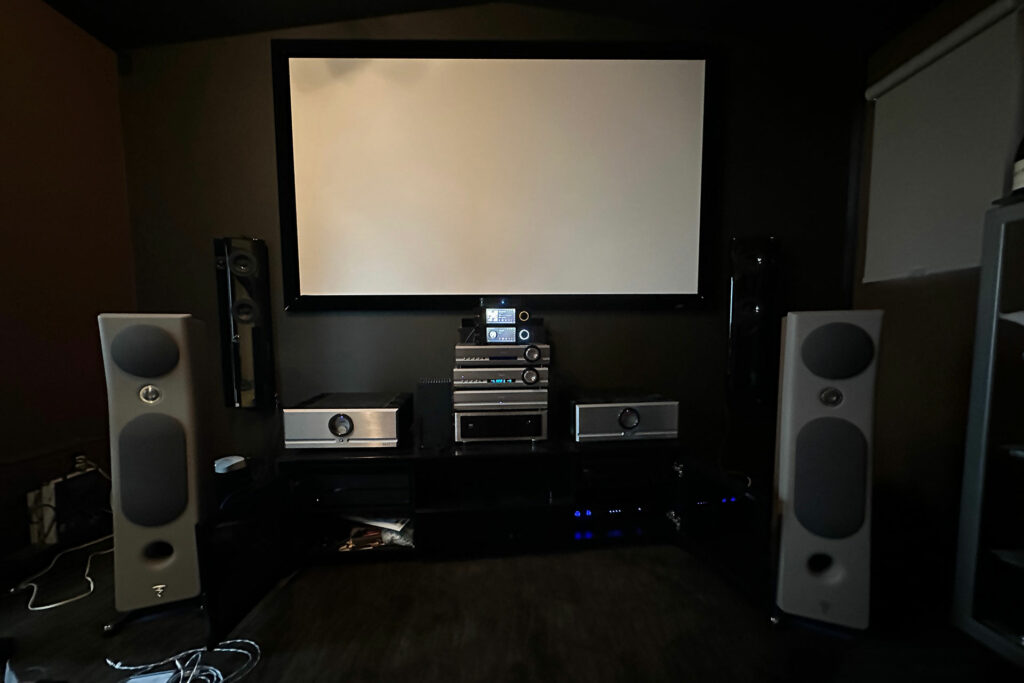
Final Thoughts on The Eversolo DMP A6 Music Streamer…
The Eversolo DMP A6 at $859 is an all-out assault on the establishment, and that must be applauded by those of us who love a great audiophile value. Its feature set is significant and, when combined with its build quality and appearance, it is understandable why this product is intoxicating and popular within its segment.
The sound quality of the Eversolo DMP A6 is good and on par with the popular but less expensive Bluesound Node. All else being equal and given its attributes, I would pay the additional $360 cost over the Bluesound Node for the Eversolo DMP A6. However, all things are not equal in the real world. What gives me pause is the lack of customer support and response from Eversolo, leaving consumers with a do-it-yourself exploratory path to support, combined with its short tenure in the consumer electronics industry, especially when some excellent alternatives are on the market today. My concern is not any of these issues individually, but rather the layered risk of these issues when considered collectively. Personally, I will hold out on the Eversolo DMP A6 for these reasons, as it is not worth the risk. Plus, the Orchard Audio Pecan Pi+ does sound better. More to follow on that.
Eversolo DMP A6 Streamer FAQ
Is Eversolo a Chinese Company (CHI-FI)?
Yes.
And they have issues getting product into the United States for sales. While sold at mainstream venues like Amazon – inventory is often very limited. If you are in the market for an Eversolo product and see on in stock – consider taking quick action as inventories dwindle quickly.




Nice review, thanks Greg. I was impressed with the Eversolo streamers. In my product comparisons shopping for a streamer I whittled the plethora of choices down to Eversolo and HiFi Rose, eventually going with the Eversolo DMP-A8. Several reasons really, I liked the upgrade to the Femto Clocks over what the A6 implements, the use of the higher end AKM chip set, the combined Linear & Digital Dual Power supplies, the fully balanced R-2R analogue volume control (which I set to .5db increments) gives you very nice volume control, the stepped up inputs / outputs, the depth of the DSP adjustments you can make, etc. What really tipped the scaled for me was the depth of the user interface, and the ability to “cast” the screen to my iPhone to control every aspect of the A8. Just really nicely implemented.
I use the A8 for two setups I have in my 2-channel rack. Firstly as just a streamer, going USB out to a PrimaLuna EVO100 Tube DAC and then into a PrimaLuna EVO300 Tube Integrated, powering a pair of GoldenEar Triton One.Rs, and secondly as a streamer/DAC/preamp, out the balanced XLRs into an Emotiva XPA2 Gen3 amp, powering a pair of SVS Ultra Towers. The Eversolo doesn’t miss a beat with either configuration, its a simple selection in the Source menu to select the different output, couldn’t be easier. I’m enjoying streaming Qobuz (built in app in the Streaming menu), and Apple Music (with a dedicated App in the A8). Lastly, I like the way Eversolo provides updates to the unit via my wired connection. Newer product line, absolutely, but they’ve come out of the gate swinging. And for me, it’s a great product that should be at the top of everyones short list.
Thanks again for the Eversolo review.
Thank you Ed. I am glad you found a network player that you like. As I was writing the DMP A6 review, the DMP A8 was recently released. I have not had the pleasure of using it. But it sure does sound great on paper, or in this case Online. Have fun with your new set up and enjoy the ride.